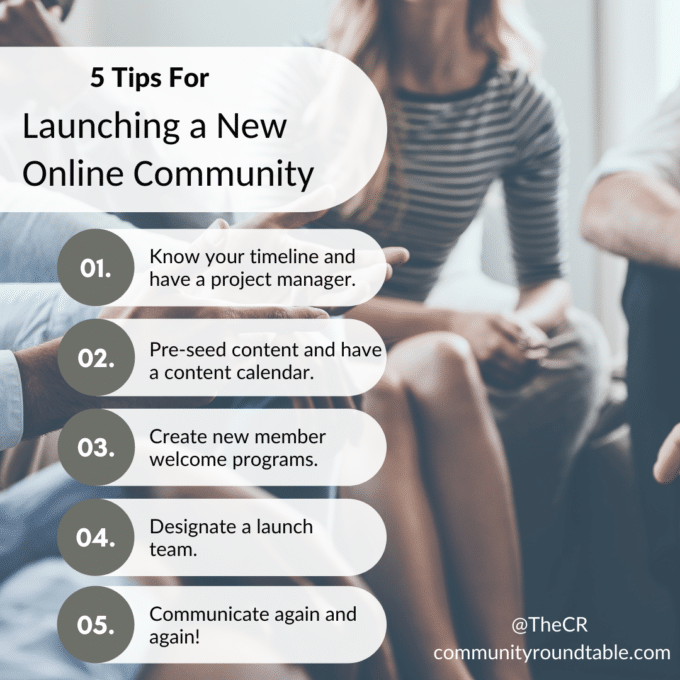The idea of not planning for a grand launch day for your online community is hard to consider. You’ve spent months project managing and planning for the launch, so of course, you want to celebrate!
But, having a huge to-do to launch a new community can set up unrealistic expectations that tend to follow the hype of a grand online community launch. The hype and tunnel vision surrounding a grand launch can skew your metrics for a long time. This can cause the community’s maturity model to be locked in too early as it has not had the opportunity to evolve to see what kind of online community maturity model truly fits).
You don’t want to encourage short-term, campaign-style thinking vs. a long-term community engagement outlook.
You want to start as you plan to continue. And we recommend starting small, leaving room for incremental and sustainable gains.

1 – Know your timeline Despite the advice above to NOT have an online community launch day, you should…consider a launch day (if you need help, we have an entire resource bundle on how to launch an online community). Not a real “grand launch day”, but a launch process that has a concrete end date. Spend time defining a pre-launch checklist then you can focus energy on determining what tasks you need to get done and by when. Make sure you prioritize tasks and save enough time for each plus wiggle room. Surprises will come up!
Beta programs are your friend. You can roll out membership to a small group of members to seed the community with content and engaged comments. You can use your beta users to test the community, then invite the rest of the group for a more formal launch.
2 – Don’t be afraid to pre-seed content One path to easy pre-seeded content is to curate content from other areas of your business. This might include library documents/entries, resource threads, thought leadership questions, and existing user programs. Consider populating your community with “low hanging fruit” questions – this allows members to participate in a low-risk way and will help them become comfortable engaging with more dense conversations.
Mobilize your super users and key stakeholders to be the “life of your party”. Find the people who will get others excited about the space and support them in their participation. Offer them opportunities to collaborate with you and take a larger role in the community if they want it. This is a great way to lay the groundwork for an advocacy program down the line.
Whenever you are talking about your community or thinking about how to make your community critical to your organization, ask yourself, “How can I offer something here, that cannot be found elsewhere?” This is the motivation that drives people inside the community and keeps them coming back. Instead of sending an email or searching on for information, you want your members to come to the community first. Add content and create programs that give them a reason to do that.
3 – Create new member welcome programs Our research has shown that robust new online community member welcome programs have an outsized impact on long-term engagement. It makes sense – having someone welcome you, give you some ground rules on behaviors, give you a tour of the community, etc., makes new members more comfortable, and you’re more likely to dip a toe in a new community if you have ideas for how to do it.
One of the hardest things to remember is that while the new member process can seem boring and rote to the person conducting it, to the new member it’s all brand new. Luckily, automation has come a long way in the last few years, allowing even the smallest community team (we see you, lone wolves) to have a big impact on the way new members start their community journey with you. You can review five best practices for new member onboarding programs here.
4 – Designated a launch team – Make sure you know who will be helping you launch the community and make sure that team has the necessary skills. Do you need IT involved? What about customer success? At this point you’ve pre-seeded your community with a group of super users, so you’ll also want to include these advocates as a part of your launch team. Get their thoughts and feedback on how the community functions and engage them as things roll out. Make sure everyone involved is clear on timelines, their responsibilities, and what is expected of them.
5 – Communicate, Communicate, Communicate You cannot over-communicate your community launch. Create a communications plan so that you’re sure to spread out the activity over time. You’ll want to vary the mediums and tactics you use to reach your entire audience. It’s important to ensure you’re reaching all users consistently.
You can’t do this all yourself, so use your team, advocates, and stakeholders to help spread the word. Be flexible and open to the fact that this might take time. Everyone’s membership base is different and some things will work, others won’t. Remember that things won’t always work right away.
Be prepared to evangelize! You’ll be selling your community and the value of your community. Perfect your elevator pitch and what your community brings to the table and know how to present it to different kinds of people. Not everyone will “get” it right away and that’s okay, keep trying and sharing the message.
